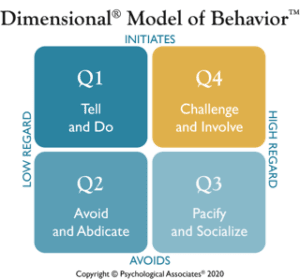Overworked and Overwhelmed
You’re a manager. A leader in the organization. Yet why, whenever it’s crunch time, are you the one burning the midnight oil? Why don’t your team members step up to the plate and help out more? The slugs! It always falls on your shoulders, and this is getting old. This case study examines why managers feel overworked and overwhelmed, as well as barriers to delegation.
The Situation
Paul is a middle manager for an insurance organization. He has a team of four direct reports who generate internal customer research for a number of other units within the company.
Paul considers himself an effective communicator. He believes his interactions with people are Q4; that is, he listens and tries to respond to their needs. He gets along well with his team and is quick to point out that, as a group, they turn out a lot of work.
Inundated with Work
Yet, Paul is frustrated because he feels he must do more and more of the heavy lifting. The others are always busy, but as big deadlines approach, Paul is the one burning the midnight oil. He finds himself frequently working late nights and weekends to get everything done on time.
Since he communicates well and has little conflict within his group of eager workers, he isn’t sure how he’s ended up in this situation. He just knows that he’s sitting in front of his computer and it’s 10 p.m., and he feels a certain resentment that things have come to this again.
How to Stop Feeling Overwhelmed
From a leadership perspective, what does Paul need to do?

Delegation of Authority
Paul is making the mistake of thinking a smooth working relationship is what Q4 leadership is all about. Q4 managing means delegating and collaborating, not just communicating effectively. Q4 helps direct reports perform to their potential. If Paul isn’t trying to develop his people, he is missing the essence of Q4 leadership and the importance of delegating fairly and effectively.
Barriers to Delegation
As a boss, Paul needs to ask why he consistently does the difficult and pressing assignments himself, rather than delegating. There may be a gap between his perception of himself as a leader and the reality of the situation.
A study of 332 companies found that half were concerned about their employees’ delegation skills and that only a quarter offered any training in delegation. When people are used to doing everything themselves, delegating can feel very foreign. They haven’t done it before, and they aren’t very good at it. Delegation training can certainly help.
Q3 Delegation
If Paul is sparing his team the burden of hard work, he is being Q3. He wants his team to avoid pressure. Or he thinks the team is overloaded and cannot take on more. So, he shields them from challenges.
5 Tips for Delegating When Your Team is Swamped
- Are any team members working on things that are not a high priority? As Lefton and Loeb point out in their book, Why Can’t We Get Anything Done Around Here, ridding black hole activities can gain back a lot of time.
- Can you decrease your team’s interruptions, enabling them to be more productive? For instance, can you implement email-free hours where team members don’t process email? Or a non-interruption time where team members are thinking, working, and shouldn’t be interrupted unless absolutely necessary?
- Can you make team meetings shorter or less frequent to free up additional work time for your team members? Is there anyone who doesn’t need to attend?
- Can your team members delegate any of their tasks, enabling them to be more productive instead of just busy?
- Are you on the same page with your team regarding their project goals and what good work looks like? You don’t want them spending 50 hours on a project when 10-15 hours is more than sufficient. Are you checking in with your team appropriately to ensure they are on track and to provide any help they need?
My Boss Doesn’t Trust Me
It’s likely that Paul is being Q1 without realizing it. If he avoids delegating work because he feels he can’t depend upon others to get it done or to do it right, this reflects a Q1 low regard for them. He considers himself more reliable.
Feeling that “others cannot do the work as well as me, so why delegate” is a self-fulfilling prophecy. If you don’t delegate, how is your team ever going to develop skills and advance in the organization? No wonder Paul is constantly overworked and overwhelmed!
Paul may say he’s simply saving time and that pressing deadlines don’t give him the luxury of training or developing his direct reports properly. However, over time, this is an excuse. When will the time be right? When isn’t his company busy? It may take 4 hours to train the person when you can do it in 2. But if the 4-hour task arises every month, you’ll save yourself 24 hours—3 workdays—over the course of the year by investing a half-day to develop your employee.
The fact is, by definition, Q4 leadership finds ways to develop people’s potential and skills. These may include formal education, mentoring, coaching, cross-training, or pairing people on projects with those who have higher skill levels.
Not Seeing Work Overload as a Delegation Issue
Does Paul realize that his frequent work overloads could be solved by delegating? No. He thinks that he alone can perform these tasks and achieve the high standards he thinks are needed. His people aren’t capable of this, so delegation is not an option. Paul’s Q1 attitude blinds him from seeing that his being overworked and overwhelmed is a delegation issue! Instead, Paul sees the solution as putting in more hours—coming in earlier, staying later—and finding ways to work more efficiently.
When you are working long hours, feeling indispensable, and your staff isn’t very energized and doesn’t have a lot to do, this is often a sign of inadequate delegation. If your team members say they are “happy to help you with this,” this could be a sign that you are delegating tasks rather than responsibility.
Delegate Authority – 7 Best Practices
- Don’t delegate tasks. Delegate responsibility and the authority to go with it.
- Communicate to appropriate people the authority the person has for this project to remove possible obstacles.
- Check progress periodically. Delegate, don’t abdicate.
- Don’t jump in and micromanage. Instead, set goals with them, and provide freedom within a framework. Provide guidance. Expect that there will be errors as people learn. Coach them to ask the right questions and solve their own problems.
- Always be on the lookout for tasks you can delegate to develop your people.
- Ask your team to give you feedback on your delegating and to call you out if you are not delegating enough.
- If you are used to not delegating, it may feel awkward at first, but don’t worry. You’ll learn and get better the more you do it.
Benefits of Delegation
“Your most important task as a leader is to teach people how to think and ask the right questions so that the world doesn’t go to hell if you take a day off,” writes Stanford Business Professor Jeffrey Pfeffer in What Were They Thinking?: Unconventional Wisdom About Management.
There are big payoffs to effective delegation. Paul’s people will not only grow in their work and become more competent and reliable, but Paul will be able to delegate work with confidence and really unleash the power of teamwork when the big crunches come along. Paul will be more highly regarded as a leader who develops his people and gets them ready for bigger roles. Turnover will also decrease as employees are developed with stretch assignments and challenged. Who wouldn’t stay longer when you see that the company is investing in you and developing you to be able to do bigger things in the future?
Your Next Steps as a Leader
Thanks for reading about being overworked, overwhelmed, and barriers to delegation.
To learn more on effective delegation, check out our Why Can’t We Get Anything Done Around Here book and companion workshop.
To learn more about leadership, visit our leadership learning page. It contains over 40 more leadership case study tips, as well as white papers, books, and more.
If you are ready to take action and become a more effective leader, we offer a number of leadership development resources that can help, including workshops, coaching, 360 surveys, and more.
Finally, we invite you to subscribe to our monthly newsletter for upcoming events, new leadership tips, and more.













